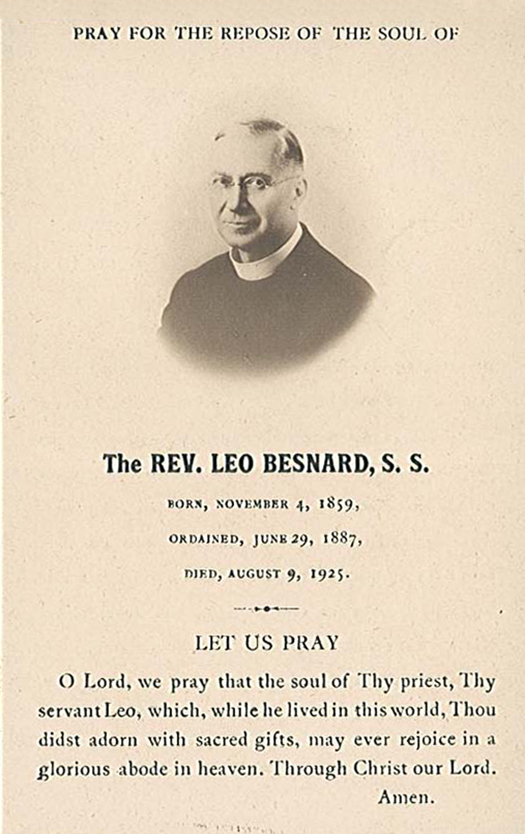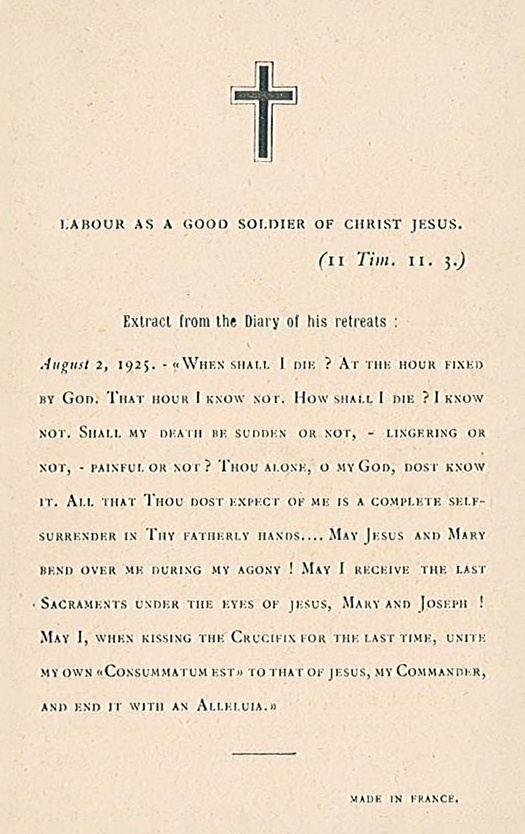Besnard, Father Leo
1925, August 9
Date of Birth: 1859, November 4
Paris
October 18, 1925
Fathers and Very Dear in Our Lord:
You learned during the vacation of the death of our confrere, Father Besnard, a director at the Baltimore seminary. Some details have reached me from Father Bruneau and from the Baltimore Catholic Review of August 15, 1925. Put together, these details are such that they must arouse our regret for the loss we have suffered in the person of one of our best confreres. They must also be for us a consolation in our grief and justify our hopes in the favorable welcome that the good Master will have given to him who was always his faithful servant. What a beautiful soul of the priest – a soul simple, just, brave, generous, unselfish, without weakness or wavering, at a hard task for thirty-seven years, and seeking no other recompense than the acknowledgment of duty accomplished with the satisfaction of preparing good priests for God.
Father Léon Marie Emile Besnard was born at Lisieux in the Diocese of Bayeux on November 4, 1859. He had very good parents who gave him the example of a Christian life and the lesson of hard work.
The first idea that he had for planning his life was that of becoming a soldier in the service of France. At the qualifying age he enlisted in the artillery for a year as was then the law for military service.
After the year was over, he was inspired to think of a higher vocation. He wanted to be a priest. Without losing anything of what barracks life had been able to give him in the way of experiencing and communicating patriotic fervor, he entered the seminary of Bayeux. There he made the normal preparation, was ordained priest on June 29, 1837, and soon expressed his desire of being assigned to seminary work.
Admitted to the seminary at Paris, for a year he followed the special courses of study at the Catholic Institute of Paris and at Stanislas College. Then he made his Solitude at Issy. When the time came to receive his assignment, he opted for the Baltimore seminary.
Father Magnien, then Superior of our American work, thought it useful to have him enroll for a year at the University recently founded in Washington. It was to give him the means of familiarizing himself with the English language and of completing the scientific studies for which he seemed especially gifted. His preparation thus settled, he returned to the Baltimore seminary. Naturally, the science course was given to him. To it he added other jobs, such as the direction of music at the seminary and at the Cathedral. In this double role, he proved to be of exceptional virtuosity. As Professor he had a zest for teaching, a cleverness as an experimenter – one could say – the rare merit of being inventor and designer. As an artist in music, he knew how to liven the singing of the choir. He saw in it a duty, he brought to it a zeal – to the extent that even alone, without hearers, for the joy of his soul, for the good God, it often occurred to him to go, like St. Francis of Assisi, to the chapel organ and make music. His was a religious soul. On the occasion of his visits to France he had the joy of saying Mass at the Carmel of Lisieux, of speaking with the holy nun, Therese of the Infant Jesus, a saint whom he loved, whom he prayed to, whom he got others to pray to, like the Americans whom we are too readily tempted to see as business men and who show themselves as men of devotion, especially in regard to the young saint called by them the Little Flower.
His piety was also shown in the care he took to build a Lourdes grotto, a little structure which he made a gathering place especially for the seminarians who helped him build it and who, moreover, were encouraged by him to come there for frequent homage to the Blessed Virgin.
His was a will, alive, and always up to something. His recreations were always a continuation of his work in the sense that his work was for the benefit of the seminarians. The give-and-take of conversation was not for him. He was usually to be found in his Physics Room, in his laboratory, in the act of installing something, preferably something to benefit the community and to please either his confreres or the seminarians.
It might be feared that sometimes this external activity in various acts of service – especially those of a material nature – could be prejudicial to the interior life and could be an obstacle to good spirituality. With Father Besnard, this was not so. He was always known for the intense sincerity of his piety and virtue.
He was a morning person. He said Mass at half past four, he made his morning prayer with the community, he attended all the exercises, he was at chapel at the appointed times every day, he nourished himself on the purest sources of the supernatural life in reading the most highly thought of authors. The inattention to his surroundings which he displayed was due to his continual intimacy with the good God. He lived with the feeling of that Divine Presence and, in speaking of it to those around him, he knew its secret and its cost.
His charity in this regard was especially used for the benefit of the seminarians, but it had (with permission granted on a regular basis) a useful extension outside, especially in the care that he took of several religious communities. The Sisters of Providence were the most favored. He gave them the benefit of his knowledge of science, he preached retreats to them, he gave them conferences suitable to their state. He gave up his vacations to that work, all the more willingly as he considered it a necessity in this new land where God’s workers have it hard enough in their kind of work.
An accident happened to him in October 1924 while he was playing the organ in the seminary chapel: he broke his leg. The fracture was painful, long in healing. It never completely healed in spite of the attentive care of the doctors and nuns at St. Agnes Hospital. Reduced to immobility, he was very patient. Even in this forced rest his cleverness helped him to get to work again. He came back to the seminary in February 1925. He took up his teaching again. At Easter he had the great joy of resuming the celebration of Mass. He wanted to live so that again he could be of service. When the school year was over, he had the generous idea of seeing once more his dear Sisters of Providence on Staten Island near New York. He believed that he had recovered sufficiently to preach their retreat. Especially memorable was his conference on death: “Where shall I die? When shall I die? How shall I die?” Altogether it was simple, sweet, and strong. There was emotion in the conference room and something of a foreboding in the preacher. That foreboding he kept as his own secret and even spoke of his intention to return to Baltimore before the Feast of the Assumption.
All the while his illness was slowly advancing, perhaps because of the shock of his accident, the overexertion of the trip, the strain of preaching. As the retreat went on, pneumonia developed. Death came rapidly but with him conscious, courageous, and consoled with all the spiritual helps that the Church provides for her children. He was well prepared. We have the evidence of that in a beautiful prayer which he composed in his last retreat. Here is the text:
“When shall I die? At the hour fixed by God. That hour I do not know. How shall I die? I do not know. My death will be sudden or not, drawn out or not, painful or not. You alone, O my God, know. For all that you foresee for me I put myself completely in your Fatherly hands. May Jesus and Mary be with me in my agony. May I receive the last sacraments from Jesus, Mary, Joseph! In kissing the crucifix for the last time, may I join my Consummatum est to that of Jesus my Leader and end it with an Alleluia!”
We have no right to add an Alleluia to the Office of the Dead. But does not that cry of the heart open to our hope a view of Heaven?
Would little Sister Therese of Lisieux have come to meet him? He gave his soul to God on the evening of Sunday, August 9th. Father Bruneau went to give his confrere the last things due him. In doing so, he expressed in the name of the whole Society the tribute merited by the dear departed through his services and his example. He oversaw the bringing of the body to Baltimore where was held the Solemn Funeral Mass at which his numerous friends, priests and laymen, were present to give evidence of their deep feeling for the deceased and for the afflicted family. Burial in the little cemetery on the grounds of St. Mary’s Seminary followed.
I recommend Father Besnard to your prayers and I renew to you the expression of my very devoted sentiments in Our Lord.
H. Garriguet
Superior General of St. Sulpice


